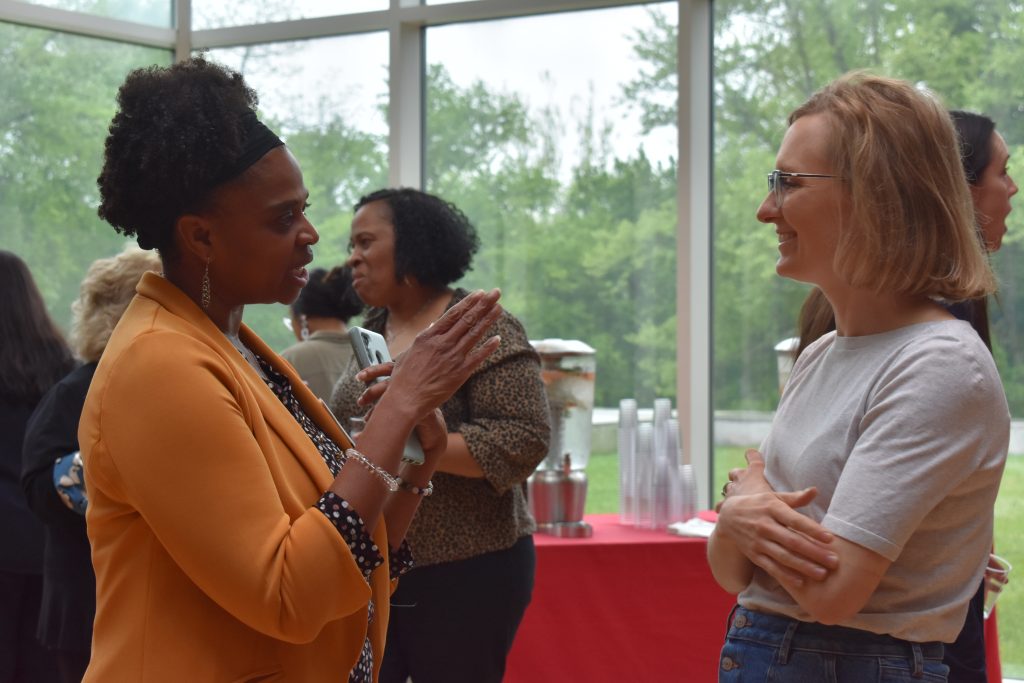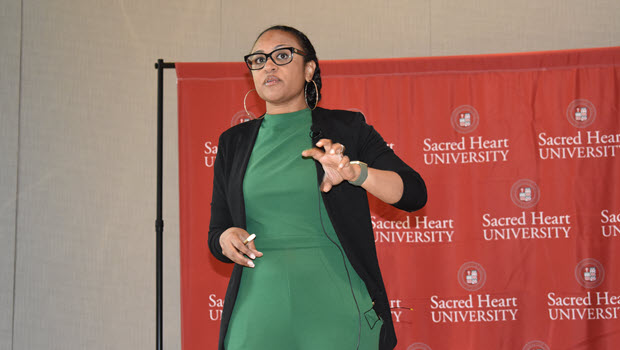“As a little Black girl, I didn’t feel seen or heard,” says South Windsor math coach Michelle McKnight, who has taught and led training in social justice math. “That’s why I decided to go into education.”
McKnight spoke before hundreds of fellow educators on May 16 at Sacred Heart University’s eighth annual Teacher Leader Fellowship Academy Institute, hosted by the university’s Farrington College of Education and Human
Development, with support from CEA. The theme was “Boldly Reimagining Our Schools: Nurturing Genius and Joy.”
“Dr. Gholdy Muhammad introduced me to ideas about how we can participate in math and science,” said McKnight, “and she inspired me to think through what we are providing to each of our students and how we can uplift their histories and teach from the heart. She is passionate about lifting up the voices of those most marginalized, and so am I.”
Muhammad (pictured above), an associate professor of literacy, language, and culture at the University of Illinois Chicago and a former classroom teacher, was the event’s keynote speaker. Her subject? Cultivating genius and joy in education through culturally and historically responsive pedagogies.
“Raise your hand if you learned about Black literary societies as a K-12 student,” she asked.
Among more than 200 educators in attendance, not a single hand went up.
“The erasure of BIPOC genius and the absence of diverse scholarship from teacher prep programs, textbooks, and curriculum is reflected in our curriculum,” she said, adding, “Our education system is not designed to honor Black and Brown children. They are learning against a curriculum not designed for them to succeed. What we can control is what we teach them and how we teach them. If children are the flowers, teachers are the water. But how do we water an earth made dry by systemic racism and oppression? Consider which of these requires intervention: the child or the curriculum?”

South Windsor math coach Michelle McKnight and Dr. Lindsay Keazer, Sacred Heart professor of math education, discuss culturally responsive teaching.
Describing some of the ways students of color in particular have been underserved in learning standards, policies, and school practices, Muhammad encouraged fellow educators to examine their own pedagogy and focus on helping students in these and other ways:
- Develop their identity and make sense of who they are
- Develop skills and proficiencies across content areas
- Name, understand, question, and disrupt oppression
- Find joy, by ensuring that when they enter a room, students feel seen, feel loved, and feel a sense of belonging
“What does this look like in a lesson plan or an evaluation?” she asked. “You have to believe in a child’s genius even if you can’t see it directly right away.” She added that among the more than 140 languages spoken by Connecticut students and their families, we often encounter names that are unfamiliar.
“We need to learn them and pronounce them correctly,” she said. “When we say, ‘I can’t say your name,’ or ‘Let me give you a nickname,’ the erasure persists.”
7 Questions to Ask About Your Program of Study
1. Is my instruction reflective of my students’ histories and identities?
2. Are students reading from diverse authors?
3. Are we reading and learning BIPOC theories?
4. Are assignments pushing students to think about, understand, and disrupt oppression?
5. How is my content connected to real life?
6. Am I energized for teaching and learning?
7. Have I done the things I ask my students to do?







